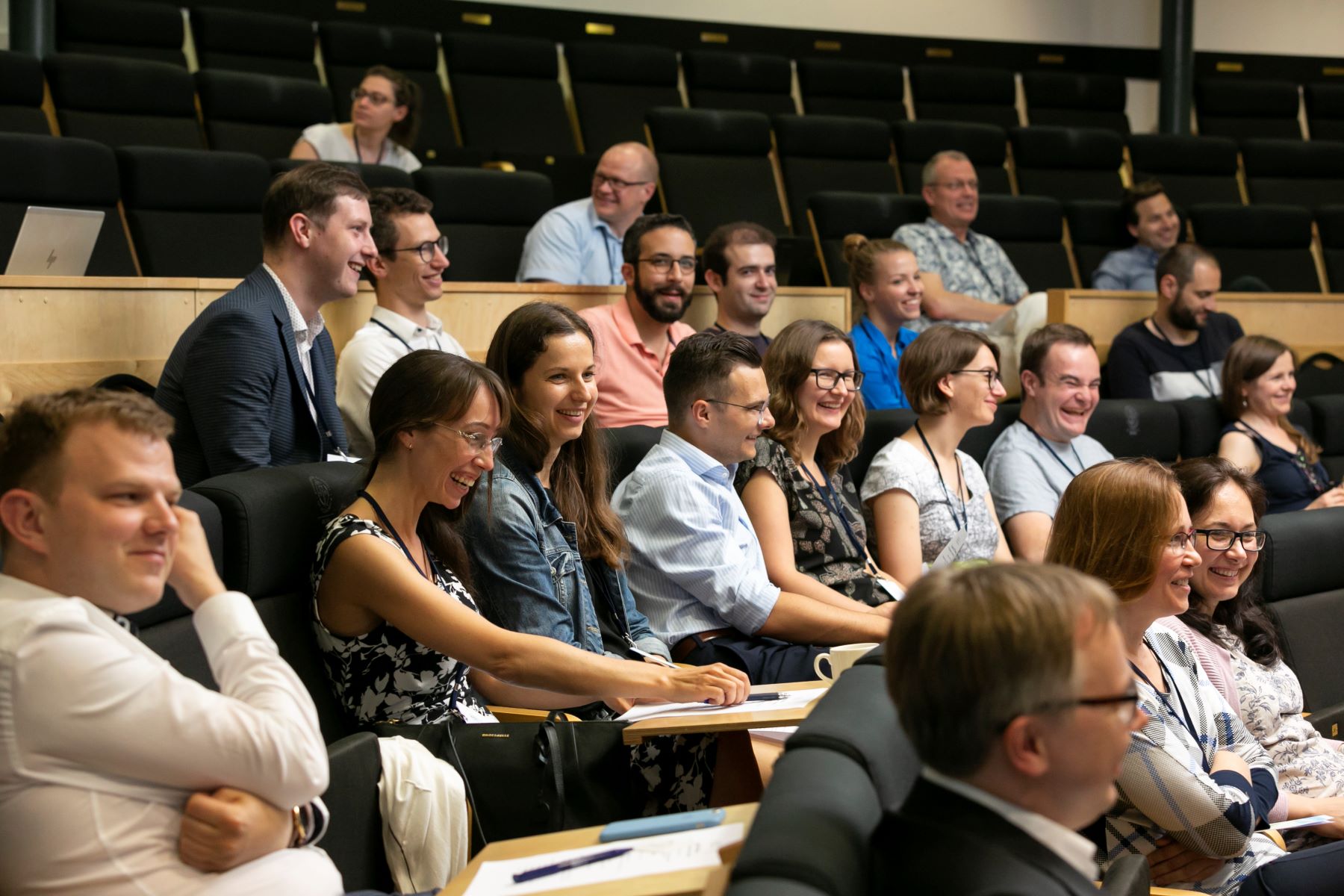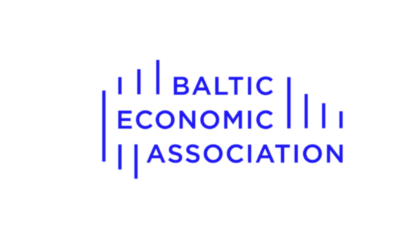The 6th Baltic Economic Conference
June 27-28, 2024
Tallinn, Estonia
Organized by the Baltic Economic Association, in cooperation with Eesti Pank, Tallinn University of Technology, and Estonian Business School
PROGRAM
Thursday, June 27
8:45 – 9:15 Registration and welcome coffee
9:15 – 10:00 Opening of the conference and welcome address
Tairi Rõõm (President, Baltic Economic Association);
Madis Müller (Governor, Bank of Estonia)
10:00 – 11:30 Parallel sessions A
10:00 – 11:30 Session A1: Monetary policy and inflation I
Chair: Andrejs Zlobins
Karol Paludkiewicz (Deutsche Bundesbank): “Excess reserves and monetary policy tightening”
Discussant: Andrejs Zlobins
Jaehun Jung (Sungkyunkwan University): “Monetary policy and the flattening of the Phillips curve: Do inflation expectations matter? “
Discussant: Karsten Staehr
Andrejs Zlobins (Bank of Latvia): “Quantitative tightening: Lessons from the US and potential implications for the EA”
Discussant: Karol Paludkiewicz
10:00 – 11:30 Session A2: Economic modelling I
Chair: Francesca Loria
Amaresh Kumar Tiwari (University of Tartu): “Estimating production function and the productivity impact of export persistence using revenue data”
Discussant: Guillermo Hausmann Guil
Guillermo Hausmann Guil (Vilnius University): “Solving open economy models with incomplete markets by perturbation”
Discussant: Amaresh Kumar Tiwari
Francesca Loria (Federal Reserve Board): “Understanding growth-at-risk: A Markov-switching approach”
Discussant: Dmitry Kulikov
10:00 – 11:30 Session A3: Labor economics I
Chair: Linas Tarasonis
Oļegs Tkačevs (Bank of Latvia): “Understanding how job retention schemes reshape the within-occupation skill profile of firm employees”
Discussant: Linas Tarasonis
Ija Trapeznikova (Royal Holloway University of London): “Parental wealth and early labor market outcomes”
Discussant: Oļegs Tkačevs
Linas Tarasonis (Bank of Lithuania): “Bargaining over severance: evidence from employment protection reform in Lithuania”
Discussant: Ija Trapeznikova
11:30 – 12:00 Coffee break
12:00 – 13:00 Keynote speech: Gianmarco Ottaviano “Revealing Ricardian comparative advantage with micro and macro data”
13:00 – 14:00 Lunch
14:00 – 15:30 Parallel sessions B
14:00 – 15:30 Session B1: Monetary policy and inflation II
Chair: Enes Sunel
Kyriakos Neanidis (University of Manchester): “The bank-lending channel of macroprudential policy: Evidence from cross-border bank flows”
Discussant: Enes Sunel
Seong-Min Yoon (Pusan National University): “Extreme connectedness between oil shocks and US sector markets”
Discussant: Natalia Levenko
Enes Sunel (OECD): “Monetary policy transmission and competition in the banking industry”
Discussant: Kyriakos Neanidis
14:00 – 15:30 Session B2: Economic modelling II
Chair: Olegs Matvejevs
Ryohei Oishi (University College London): “Fiscal adjustments and optimal monetary policy in HANK”
Discussant: Olegs Matvejevs
Žymantas Budrys (Bank of Lithuania; Vilnius University): “The term structure of judgement: interpreting survey disagreement”
Discussant: Ryohei Oishi
Olegs Matvejevs (Bank of Latvia): “A purpose-based energy substitution structure for CGE”
Discussant: Žymantas Budrys
14:00 – 15:30 Session B3: Wealth inequality and family economics
Chair: Tairi Rõõm
Hannah Paule-Paludkiewicz (Deutsche Bundesbank): “Stuck in a marriage: The impact of labor market shocks on divorce and intra-household allocation”
Discussant: Tairi Rõõm
Denis Ivanov (Vilnius University): “Wealth inequality and mega events“
Discussant: Hannah Paule-Paludkiewicz
Tairi Rõõm (Bank of Estonia; TalTech): “Unraveling the overlooked dimension: wealth inequality at the household vs individual level”
Discussant: Denis Ivanov
15:30 – 16:00 Coffee break
16:00 – 17:30 Parallel sessions C
16:00 – 17:30 Session C1: Monetary policy and inflation III
Chair: Jaanika Meriküll
Ludmila Fadejeva (Bank of Latvia): “Consumer price rigidity in the Baltic States during periods of low and high inflation”
Discussant: Jaanika Meriküll
Edmond Berisha (Montclair State University): “Oil prices, monetary policy, and income inequality: the role of education”
Discussant: Ludmila Fadejeva
Jaanika Meriküll (Bank of Estonia; University of Tartu): “Monetary policy and earnings inequality: inflation-dependencies”
Discussant: Edmond Berisha
16:00 – 17:30 Session C2: Economics of education
Chair: Kaire Põder
Simona Ferraro (Tallinn University of Technology): “Inclusive education in Soviet-inherited exclusive school system: The effects of student background factors on school efficiency”
Discussant: Willian Addessi
William Addessi (University of Cagliari): “Exploring the objectives misalignment between higher education institutions and social planner in economic fragile regions”
Discussant: Kaire Põder
Kaire Põder (EBS): “Family background effect on electoral participation and how schools can treat it?”
Discussant: Simona Ferraro
16:00 – 17:30 Session C3: Labour economics II
Chair: Konstantins Benkovskis
Karol Madoń (Warsaw School of Economics; Institute for Structural Research): “The role of global value chains for worker tasks and wage inequality”
Discussant: Konstantins Benkovskis
Nerijus Černiauskas (Vilnius University): “The earnings distribution in Lithuania: The role of the minimum wage”
Discussant: Karol Madoń
Konstantins Benkovskis (Bank of Latvia; SSE Riga): “Unveiling the effects of minimum wage increase: Insights into macroeconomics, income distribution, and informal wage dynamics”
Discussant: Nerijus Černiauskas
18:00 – 20:00 Guided tour, start from Sokos Hotel Viru lobby
20:00 Conference Dinner
Friday, June 28
9:00 – 10:30 Parallel sessions D
9:00 – 10:30 Session D1: Trade, FDI and taxation
Chair: Nicolas Gavoille
Jaan Masso (University of Tartu): “A choice between FDI and trade for the foreign market entry: A refinement of theoretical model and empirical application to Estonian data”
Discussant: Nicolas Gavoille
Mathias Juust (University of Tartu): “Firm-level capabilities and response to a negative export shock: 2014 Russian embargo on the West”
Discussant: Jaan Masso
Nicolas Gavoille (Stockholm School of Economics in Riga): “Off the book, off the hook? COVID-19, employment, and labor tax evasion”
Discussant: Mathias Juust
9:00 – 10:30 Session D2: Behavioural studies
Chair: Kadri Männasoo
Jakub Sokolowski (Instytut Badań Strukturalnych; University of Warsaw): “How to avoid another Yellow Vests movement? Assessing public preference for a carbon tax with a discrete choice experiment”
Discussant: Daniel Schmidt
Daniel Schmidt (University of Amsterdam): “Retirement and the marginal propensity to consume: Theory and evidence”
Discussant: Kadri Männasoo
Kadri Männasoo (TalTech): “Disentangling inertia: Consumer attention and choice in car insurance market”
Discussant: Jakub Sokolowski
10:30 – 11:00 Coffee break
11:00 – 12:30 Parallel sessions E
11:00 – 12:30 Session E1: Studies on communication
Chair: Tho Pham
Oleksandr Talavera (University of Birmingham): “Beyond words: Emotional interactions in managerial communication”
Discussant: Tho Pham
Tho Pham (University of York): “Central bank communication on social media: What, to whom, and how?”
Discussant: Karin Jõeveer
11:00 – 12:30 Session E2: Corruption, common resources
Chair: Arieda Muco
Oleksii Hamaniuk (University of Bonn): “Governing the commons problem: empirical evidence from managing houses in Ukraine”
Discussant: Arieda Muco
Niveditha Prabakaran Pankova (Estonian Business School): “Unveiling shadows in the dark: Revisiting corruption and economic growth”
Discussant: Oleksii Hamaniuk
Arieda Muco (Central European University): “Corruption, intimidation, and whistleblowing: An empirical approach”
Discussant: Niveditha Prabakaran Pankova
11:00 – 12:30 Session E3: Gender studies
Chair: Swapnil Singh
Liis Roosaar (University of Tartu): “What determines the gender pay gap in academia?”
Discussant: Swapnil Singh
Anastasiia Pustovalova (University of Tartu): “Gender-biased automation and on-the-job skill requirements”
Discussant: Liis Roosaar
Swapnil Singh (Bank of Lithuania): “Social status, economic development and female labor force (non)participation”
Discussant: Anastasiia Pustovalova
12:30 – 13:30 Lunch
13:30 – 14:30 Parallel sessions F
13:30 – 14:30 Session F1: Fiscal policy
Chair: José Alves
Ernil Sabaj (University of Warwick): “The effects of government spending under trend inflation: theory and empirics”
Discussant: José Alves
José Alves (ISEG; UECE; REM): “Sovereign risk dynamics in the EU: the time varying relevance of fiscal and external (im)balances”
Discussant: Ernil Sabaj
13:30 – 14:30 Session F2: Disruptive events
Chair: Thomas Nitschka
Agne Suziedelyte (University of London): “Home-country natural disasters and mental health of migrants”
Discussant: Thomas Nitschka
Thomas Nitschka (Swiss National Bank): “The gnomes of Zürich and the New York bankers’ panic of 1907”
Discussant: Agne Suziedelyte
13:30 – 14:30 Session F3: Firm performance and dynamics
Chair: Ziran Ding
Ziran Ding (Bank of Lithuania): “The heterogeneous impact of firm upgrading on energy use”
Discussant: Janis Berzins
Janis Berzins (BI Norwegian Business School): “Family firm performance and the first-generation change: Evidence from Latvia”
Discussant: Ziran Ding
14:30 – 15:00 Coffee break
15:00 – 15:20 Bank of Lithuania and Lithuanian Academy of Sciences: Award for Dissertation in the Field of Economics
15:20 – 15:30 BEA Award for the best PhD Student Paper. Concluding remarks of the conference
15:30 – 16:30 General meeting of the Baltic Economic Association

